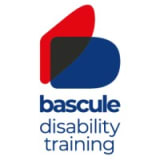This informal CPD article ‘Five Ways Disability Awareness Training Will Boost Your Business’, was provided by Chris Jay, Managing Director of Bascule Disability Training, a unique disability awareness training provider & social enterprise providing workforces with a firmer understanding of disability.
Training your staff to become disability aware will have a significant impact on the way your organisation operates. From gaining access to a newfound market, to discovering an untapped pool of potential recruits.
Here are five compelling reasons why your organisation should consider disability awareness training.
1. You can expand your market
Every organisation wants to appeal to as many people as possible, yet people with disabilities are often overlooked- despite accounting for around 24% of the UK’s population.1
You might be surprised to learn that neglecting the needs of people with disabilities as potential customers costs UK businesses approximately £274 billion per year.2
Huge changes can be made by training staff, and then identifying and removing barriers within your organisation. After staff gain an improved perspective of disability, and the necessary physical and technological adjustments are made, you have effectively opened your doors to an extra quarter of the population.
2. You improve your workplace culture
80% of all disabilities are hidden3, and 43% of employees with non-visible disabilities choose not to tell their employer they have one4 - so it’s highly likely you employ more people with disabilities than you think.
Becoming an organisation that embraces difference and supports people with disabilities, means that staff become a part of a more understanding and empathetic culture. Employees that are not disclosing their disability will certainly notice this change and be more likely to be open about their impairments. This support will naturally help them reach their full potential, leading to increased productivity, efficiency, and overall job satisfaction.
3. You can access new talent
After training your staff (especially those involved in recruitment)- and making a few fundamental changes- you will inevitably tap into a vast new pool of talent. Furthermore, if you are a genuinely inclusive company offering a supportive and understanding workplace, not only will you attract a broader range of high-calibre candidates, but you will also increase the likelihood of retaining these employees. Which is an added business benefit, when you consider that recruitment costs and the logistics of recruiting a replacement can reach up to £30,000.
4.You can increase customers and loyalty
If staff are disability aware, and able to communicate, are understanding and empathetic and supportive to the needs of customers with disabilities, the service you offer will naturally become more appealing. Customers with disabilities also tend to remain loyal to inclusive organisations and so as you improve inclusivity, you can expect repeat custom and long-term loyalty.
5. You can enhance brand recognition
Being inclusive will not only improve your brands reputation but also present numerous positive PR opportunities. Displaying your commitment to disability awareness through training can significantly benefit your public image. On the other hand- receiving negative publicity as a result of poor disability related customer service can be catastrophic and severely damage your brand and reputation.
We hope this article was helpful. For more information from Bascule Disability Training, please visit their CPD Member Directory page. Alternatively, you can go to the CPD Industry Hubs for more articles, courses and events relevant to your Continuing Professional Development requirements.
References:
[1] UK Disability Statistics- House of Commons Library: https://researchbriefings.files.parliament.uk/documents/CBP-9602/CBP-9602.pdf
2 Wearepurple.org.uk - https://wearepurple.org.uk/the-purple-pound-infographic/
3 UK Parliament - https://post.parliament.uk/research-briefings/post-pn-0689/
4 Bupa- https://www.bupa.com/news-and-press/press-releases/2022/employees-avoid-telling-employers-about-less-visible-disabilities













